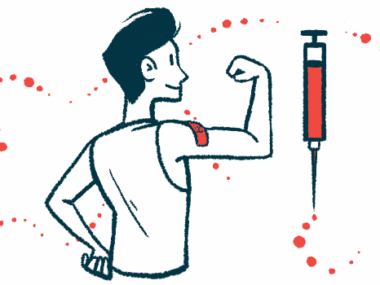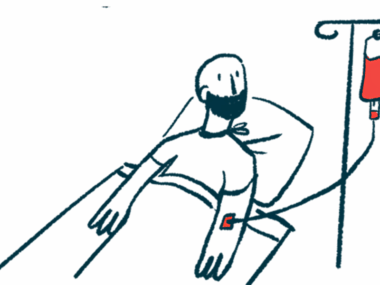Soliris sustains clinical benefit for MG in real-world setting
Treatment also found to reduce need for other medications, 2-year data show
Written by |
Soliris (eculizumab) effectively eased symptoms and reduced the need for other medications in adults with myasthenia gravis (MG) in a clinical practice setting, according to two-year data from an observational study called ELEVATE.
Findings were reported in the study “United States clinical practice experience with eculizumab in myasthenia gravis: symptoms, function, and immunosuppressant therapy use,” which was published in the Journal of Neurology.
Soliris, from Alexion, AstraZeneca Rare Disease, inhibits a part of the immune system known as the complement system. When activated in an uncontrolled manner in MG, the complement system is believed to contribute to the autoimmune attack that causes muscle weakness and drives the disease.
The medication, infused into the bloodstream every two weeks after a loading period of five weekly doses, is approved in the U.S. for adults with generalized MG, a form of the disease that causes widespread muscle weakness. It is specifically indicated for those who have antibodies against the acetylcholine receptor (AChR), the most common type of MG-causing antibody.
Its approval was based on safety and efficacy data from the Phase 3 REGAIN study (NCT01997229) and its open-label extension (NCT02301624), where Soliris was found to remain effective in the long term for patients who didn’t respond to other treatments.
ELEVATE study assessed Soliris based on MG patient medical records in US
In the new study, researchers reported findings from ELEVATE, which assessed how well Soliris worked in a clinical practice setting for adults with MG in the U.S. based on their medical records.
The study included 71 women and 48 men, with a mean age of 57.7 years at the time they started treatment with Soliris. Compared with women, men were started on Soliris a mean of 2.2 years earlier after being diagnosed (8.8 vs. 6.6 years).
Most patients (93%) had generalized disease at the time they started treatment. Most (97%) also tested positive for anti-AChR antibodies.
The most common reason for starting Soliris was inadequate control of symptoms with previous or current treatments. Most patients (82%) were treated with Soliris for at least one year during the study period, and 108 (91%) received it according to its prescribing information with no dose modifications.
First, the researchers watched for changes in scores on the MG Activities of Daily Living (MG-ADL) scale, which assesses how much the disease affects daily life. Higher scores indicate more severe symptoms.
MG-ADL scores lower, indicating less severe symptoms, after Soliris treatment
Mean MG-ADL scores in 84 patients who received Soliris per its prescribing information dropped from 8 points when they started Soliris to 5.4 points after three months. After 24 months, or two years, mean MG-ADL scores were lower, at 4.7 points.
The researchers also checked how many patients achieved minimal symptom expression, defined as an MG-ADL score of 0 or 1, or minimal manifestation status, when patients experience no symptoms or functional limitations from MG despite having some muscle weakness.
Of the 84 patients who received Soliris per its prescribing information and who had MG-ADL assessments, three (4%) had achieved minimal symptom expression in the two years before starting Soliris. After two years on Soliris, this proportion increased to 19%.
Similar observations were made about minimal manifestation status, with the proportion of patients who reached minimal manifestation status or better increasing from 5% to 30% after two years on Soliris, indicating “clinically meaningful and sustained improvements.”
“Despite differences in study design, these data from clinical practice are in accordance with findings from the phase 3 REGAIN study and its [open-label extension], and with other real-world studies, in demonstrating the sustained benefit of [Soliris],” the researchers wrote.
Majority of patients reduced their use of prednisone
Of the 69 patients who were taking prednisone at the time they started treatment with Soliris, nearly two-thirds (64%) were able to reduce their prednisone dosage, and nine (13%) stopped taking it altogether. Nearly one-third (32%) of the patients also stopped taking immunosuppressants.
These findings suggest Soliris not only eases symptoms, but also reduces the need for other medications. This is important because long-term use of corticosteroids, such as prednisone, can have serious side effects.
“Physicians were able to reduce the prednisone dosage in two-thirds of patients,” the researchers wrote. “This subset of patients experienced improvements in MG-ADL scores that were maintained and similar to those seen in the overall population, suggesting the potential for [Soliris] treatment to have steroid-sparing effects.”




Leave a comment
Fill in the required fields to post. Your email address will not be published.